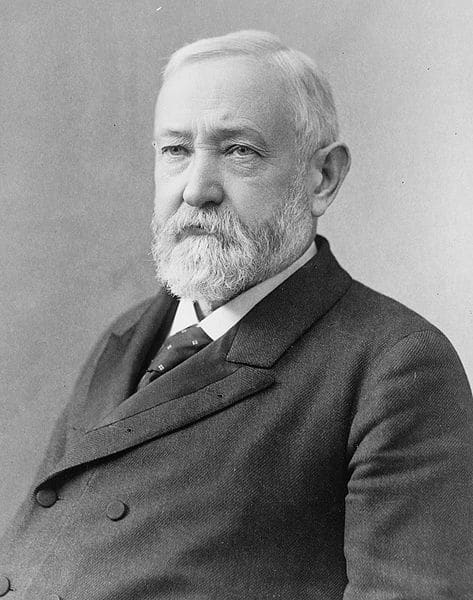President Benjamin Harrison was the 23rd President of the United States and the grandson of former President and American Hero of the War of 1812, William Henry Harrison.

He was not a well-known candidate, as he had served in the Senate, but did little to distinguish himself. However, he was one of the few Gilded Age politicians to avoid scandals, which made him an appealing option.
Once elected, he signed into law the Civil War pensions that had been denied by President Grover Cleveland and allowed the McKinley Tariff to pass, which would help the government pay off its debts to the business community.
Jump to:
Harrison's Term
March 4, 1889: Benjamin Harrison is inaugurated after he won the presidency in 1888.
April 22, 1889: Two million acres of land that was purchased from the Creek and Seminole tribes are opened for settlement, which would begin the Oklahoma Land Rush.
April 29, 1889: Great Britain, Germany, and the United States agree to be a protectorate over the Hawaiian Islands.
June 27, 1889: Congress passes the Dependent Pension Bill, which would give a pension to Union veterans in the Civil War.
October 2, 1889: The Pan-American Conference is held between Great Britain and America.
November 2, 1889: North and South Dakota join the Union as the 39th and 40th states.
November 8, 1889: Montana joins the Union as the 41st state.
November 11, 1889: Washington joins the Union as the 42nd state.
December 3, 1889: Harrison delivers his first Message to Congress.
February 10, 1890: The Sioux nation cedes 11 Million Acres of its land to the United States.
July 2, 1890: The Sherman Anti-Trust Act was passed.
July 3, 1890: Idaho is admitted to the Union
July 10, 1890: Wyoming is admitted to the Union
July 14, 1890: Harrison signs the Sherman Silver Purchase Act.
July 29, 1890: Congress passes an Anti-Lottery Bill.
October 1, 1890: The McKinley Tariff is passed, which raises the cost of goods. The bill is controversial but does help the United States pay off its debt to the business community. It would hurt the reputation of the Republicans.
November 7, 1890: The Democrats dominate the Midterm Elections. They take over the House and shrink the Republican majority in the Senate.
March 3, 1891: Harrison approves the creation of Nine Circuit Courts of Appeals.
May 6, 1891-June 4, 1892: Chilean and American relations become tense when the rebels overthrow the Chilean government that the United States supported.
June 7 - 10, 1892: The Republicans nominated President Benjamin Harrison for a second term.
June 21, 1892: Grover Cleveland is nominated by the Democrats for President.
July 6, 1892: The Homestead Massacre occurs.
July 11, 1892: Another violent strike takes place in Idaho, killing 30 miners.
November 8, 1892: Grover Cleveland wins the election of 1892 and becomes the 24th President of the United States.
January 17, 1893: Queen Liliuokalani pushes for a new Constitution in Hawaii that would free the islands from United States influence. She is deposed, and a provisional government replaces her.
